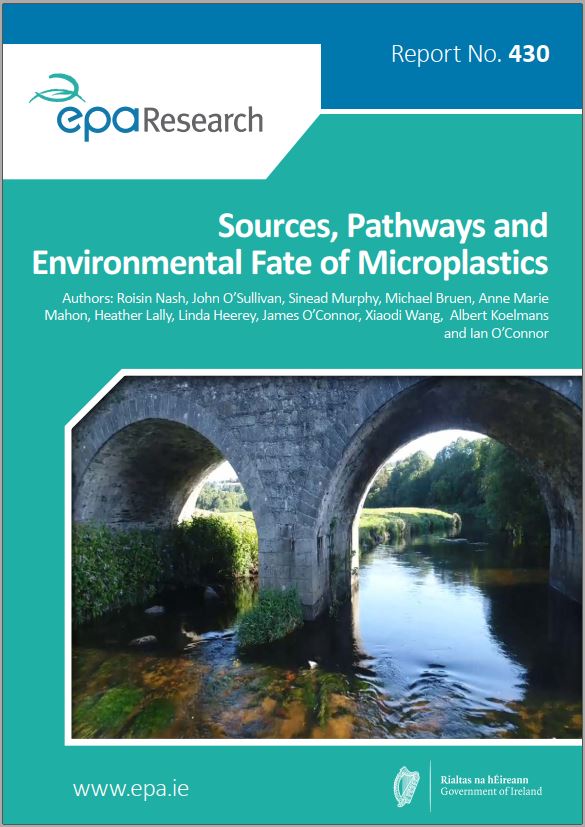Research 430: Sources, Pathways and Environmental Fate of Microplastics
Authors: Roisin Nash, John O’Sullivan, Sinead Murphy, Michael Bruen, Anne Marie Mahon, Heather Lally, Linda Heerey, James O’Connor, Xiaodi Wang, Albert Koelmans and Ian O’Connor
Summary: As plastic production continues to increase, we are seeing significant quantities of microplastics (MPs), a contaminant of emerging concern, being recorded worldwide. This research project has identified key challenges and recommendations that target MP pollution, highlighting immediate measures that could manage MP debris at known sources. This will inform the development and implementation of policies such as the Water Framework Directive.

Project Highlights
Identifying Pressures
As plastic production continues to increase, we are seeing significant quantities of microplastics (MPs), a contaminant of emerging concern, being recorded worldwide. MPs have been recorded in freshwater environments globally, adding additional pressure to already burdened systems. The cumulative impact of threats to water bodies will prevent authorities from achieving their environmental objective of being free from pollution. This research, by improving understanding of MP sources, pathways and environmental fate in freshwater systems in Ireland, aims to inform the development and implementation of policies such as the Water Framework Directive.
Informing Policy
This research project has identified key challenges and recommendations that target MP pollution, highlighting immediate measures that could manage MP debris at known sources. This will inform the development and implementation of policies such as the Water Framework Directive by improving understanding of MP sources, pathways and environmental fate in freshwater systems in Ireland. This will, in turn, reduce the amount of marine litter reaching the sea and so contribute to OSPAR’s objective in the Regional Action Plan for Marine Litter of significantly reducing amounts of marine litter.
Developing Solutions
This study emphasises that river catchments are complex, with unexplained variations in the spatial and temporal distribution of MPs. Further research is required to investigate variables such as rainfall, as well as the role of atmospheric deposition, recreational river use, hydrological events, river hydrogeomorphology and land use within catchments. Similarly, pathways need to be researched further, for example to determine whether interflow is an important pathway for MPs under rainfall erosion.
An exploration of sources has provided insight into interventions that could reduce the abundance of MPs released into the environment. The implementation of a continuous monitoring framework for MPs within river catchments is deemed necessary to monitor progress towards achieving good water quality. It is recommended that this be incorporated at a minimum level into river basin management planning in Ireland. Further exploration of sediment in conjunction with benthic communities is necessary to confirm the potential of these to act as bioindicators for MPs and would allow for short- to medium-term monitoring.
https://www.epa.ie/media/epa-2020/research/research-publications/Report-cover-430.jpg